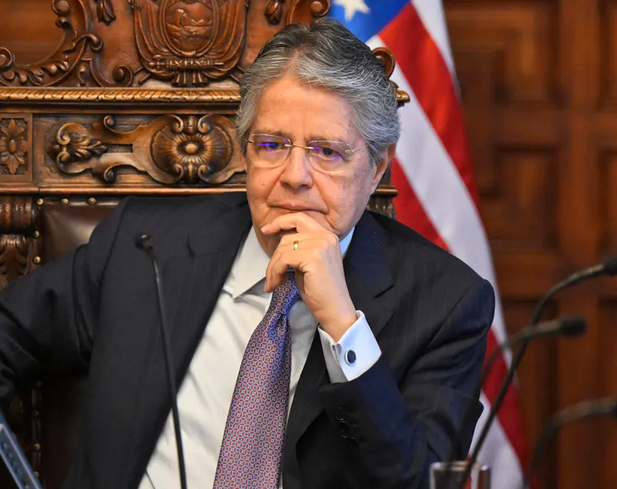As Ecuador’s impeachment drama races to a conclusion, Lasso and the country face three options
By Sylvan Hardy
As the clock ticks down to an impeachment vote in the National Assembly that could remove President Guillermo Lasso from office, political and legal experts agree he faces three options.
The first is to allow the impeachment trial to play through to the end in the belief the opposition does not have the 92 votes necessary to send him packing. Support for this scenario gained traction last week when 88 members of the Assembly voted to continue the impeachment trial. Lasso supporters and many political observers believe that the 88 votes for the trial equal the number of votes for impeachment.

President Guillermo Lasso
“This is a reasonable position given that Lasso’s opposition pushed very hard last week to record every vote against him and they came up short of 92,” says former Assemblymember and political analyst Pedro Donoso. “The thinking is that one or two votes could change but the margin is sufficient to assure he will remain in office.”
Donoso concedes however, there is danger in this assumption. “This is a thin margin and you can argue it’s too thin for comfort,” he says. “The vote [Sunday] reelecting [Assembly President Virgilio] Saquicela shows the strength of the Correistas and Lasso’s opposition in the impeachment process. Saquicela got 96 votes.”
Donoso adds that predicting the outcome of the trial is a “fool’s game”, noting the disarray of the Social Christian and Pachakutik blocs in the Assembly. “We have a long way to go until the end of this and much can change.”
If Lasso decides to allow the trial to run its course and loses the impeachment vote, Vice President Alfredo Borrero would replace him and complete the last two years of his term. “Some people are even suggesting that Lasso is tired of all the drama and would not mind having Borrero, who shares his political positions, finish his term.”
Option two for Lasso is to allow the impeachment trial to proceed but to invoke the “muerte cruzada”, or cross death, before the final vote. “He could determine, based on the calculations of his staff, that he will be expelled from office or, he could decide that the final vote is too close to call and dissolve the Assembly and call new elections,” says Santiago Mosquera, dean of the Business School of the University of the Americas. “This would be an extreme move but the president could decide the circumstances warrant it.”
According to Mosquera, the advantage of the cross death for Lasso is that he would rule the country by decree for six or seven months before a new election is held and new officials take office. “He risks being voted out of office, of course, but he also has the opportunity to impose new laws and orders without interference from the Assembly and this could strengthen is position in the election,” Mosquera says. “Most likely, he would focus on fighting the crime gangs, probably through extreme measures, and this would be popular with voters.”
Besides the possibility of being voted out of office, Lasso could also face an indigenous uprising if he invokes the cross death. “This has been threatened and is likely, in my opinion, and could be as disruptive as last June’s CONAIE strike,” Mosquera says.
“Although I think a strike is probable in the case of the cross death, it is not a certainty,” Mosquera says. “[CONAIE President] Leonidas Iza has lost much of his authority within the indigenous movement in recent months. More moderate members of CONAIE rejected his call for a strike in February and there is growing conflict within the Pachakutik party, which represents the indigenous movement in the Assembly. There is also the fact that, in the past, indigenous protests focused on issues directly affecting the indigenous population, not on broader political conflicts, so there is a question about the level of support a strike would have.”
If a major indigenous strike materializes, Mosquera says, it could force Lasso from office. “Mass protests have forced out presidents in the past and if the intensity is great enough, Lasso may feel he has no choice but to leave office, which would mean Borrero assumes the presidency.”
He adds: “If there are, in fact, mass protests, I would not bet on Lasso stepping down. Since he has come this far in the battle, he may decide to weather the storm. He has seen protests in Chile, Colombia and Peru reach a peak and then die out and may assume it will happen here too.”
A third, and certainly the most peaceful option for Lasso, is to resign from office before an impeachment vote. “He may decide that he has simply had enough and that a Borrero presidency at least means the government does not fall into the hands of the Correistas,” says Quito political science professor Arianna Tanca. “Borrero could become president under other scenarios in this process so why go through a trial and all the tension and hysteria that surrounds it?”
Tanca also points out that Lasso is in poor health. “Although this is not talked about very much, the president lives in a great deal of pain from a bicycle accident in Spain years ago and the following surgeries on this back. I believe this could play a role in his decisions in the coming weeks.”
Tanca adds: “The good thing is that all of this could be over by the end of the month. Let’s hope for the best.”

















